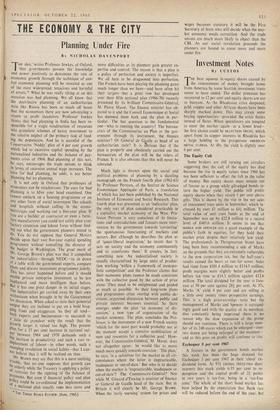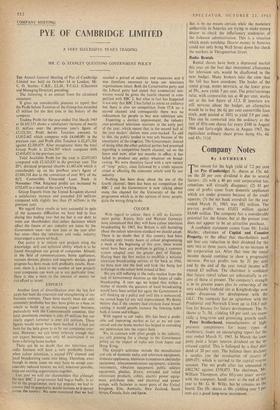Investment Notes
By CUSTOS
HE bear squeeze inequity shares caused by I the reinvestment of money brought home from America by some Scottish investment trusts seems to have ended. The dollar premium has recovered to 12 per cent and equity shares are not so buoyant. As the Rhodesian crisis deepened, gold, copper and other African shares have been sharply marked down. This may create some buying opportunities--provided the crisis fizzles instead of flares. When speculators are tempted to enter the market again— at a lower level— the first choice could be SELECTION TRUST, which apart from its copper interests in Rhodesia has a large holding in the prosperous AMERICAN METAL CLIMAX. At 49s. the yield is slightly over 6 per cent.
The Equity Cult
Some brokers are still turning out circulars suggesting that the cult of the equity has died because the rise in equity values since 1960 has not been sufficient to offset the fall in the value of money. But equity shares must remain out of favour as a group while gilt-edged bonds re- turn the higher yield. The public still prefer equity shares when they return 1 per cent above gilts. This is shown by the rise in the net sales of investment trust units in September, which in- creased by over £1 million to £44 million. The total value of unit trust funds at the end of September was up by £22.8 million to a record level of £483.6 million. It seems to me that MARKS AND SPENCER are a good example of the public's faith in equities, for they hold their market price despite their relatively low yield. The professionals in Throgmorton Street have long been busy recommending a sale of Marks on the grounds that they are extremely vulnerable to the new corporation tax, but the half-year's results caused the bears to run for cover. Sales had risen from £101.4 million to £114.5 million, profit margins were slightly better and profits before tax rose to £14.3 million against £12.6 million. The total dividend for the year is fore- cast at 30 per cent against 281 per cent. At 37s. Marks 'A' yield 4 per cent and are selling at a little over twenty times prospective earnings. This is a high price-earnings ratio but the management of Marks and Spencer is outstand- ingly good and with the quality of its merchan- dise constantly being improved there, is no reason why the slow expansion of the group should not continue. There is still a large num- ber of its 240 stores which can be enlarged—over two dozen are being enlarged at the moment— and as this goes on profits will continue to rise.
Exchequer 5 per cent 1967 A feature in the government bonds market this week has been the huge demand for Exchequer 5 per cent 1967 in their 'clean' ex- dividend form. At 97i (minus thirty-two days' interest) this stock yields 6.35 per cent to re- demption and the capital profit of 24 points in two years is tax-free, being in a 'tax-free zone.' The whole of the short bond market has been helped by the expectation that Bank rate will be reduced before the end of the year, but
this is by no means certain while the monetary authorities in America are trying to make money dearer to check the inflationary tendencies of the Johnson administration. This is a situation which needs watching. Dearer money in America could not only bring Wall Street down but check the markets in Throgmorton Street.
Radio Rentals
Rental shares have been. a depressed 'market this year on .the fear that investment allowances for television sets would be disalloWed in the next budget. Many brokers take the view that the fall has been overdone. The leader of the rental group, RADIO RENTALS, at the lower price of 39s., now yields 5 per cent. The price/earnings ratio, with corporatibn tax at 40 per cent, works out at the low figure of 13.3. If investors are still nervous about the budget, an alternative would be to buy the 61 per cent convertible loan stock,. now quoted at 1051 to yield 5.9 per cent. This can be converted into the ordinary at the rate of fifty-one shares for every £100 in August 1966 and forty-eight shares in August 1967, the equivalent ordinary share prices being 41s. 4d. and 43s. 111d.































 Previous page
Previous page